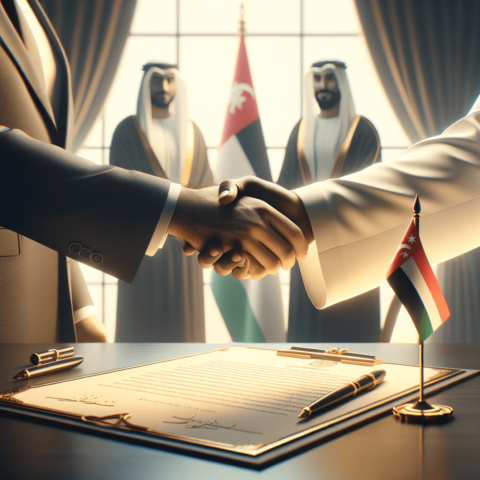
Discover the Latest Gold Rates and Trends in UAE’s Vibrant Market
July 22, 2024
Unveiling the Thrills: New BOUNCE Venue Opens at Forsan Central Mall in Abu Dhabi
July 22, 2024Dubai’s vibrant economy takes a significant step forward with the signing of a Comprehensive Economic Partnership Agreement (CEPA) between the UAE and Mauritius, promising remarkable economic opportunities for both nations.
Understanding the Comprehensive Economic Partnership Agreement
Understanding the Comprehensive Economic Partnership Agreement (CEPA) requires a look into its core elements, objectives, and unique advantages over other trade agreements. A CEPA is a robust and holistic framework designed to promote stronger economic ties between countries. Its key components typically include the elimination or reduction of tariffs, trade facilitation measures, investment protection, intellectual property rights enforcement, and the liberalization of services. Unlike standard Free Trade Agreements (FTAs), which often focus solely on goods, CEPAs encompass a wider array of economic activities, making them more comprehensive and versatile.
The primary objective of a CEPA is to bolster economic growth by fostering an environment that encourages trade and investment flows. By reducing trade barriers and enhancing cooperation in various sectors, CEPAs aim to create mutually beneficial opportunities for the participating countries. Additionally, these agreements often include provisions to address non-tariff barriers, streamline customs procedures, and promote regulatory coherence.
The significance of CEPAs in promoting international trade and economic growth cannot be overstated. They offer a structured path for countries to integrate their economies more deeply, leading to increased market access, technology transfer, and enhanced competitive advantages. Furthermore, CEPAs provide a platform for addressing broader economic issues, such as sustainable development and innovation, thus paving the way for long-term economic resilience and prosperity.
In the context of the UAE and Mauritius, the signing of a CEPA marks a pivotal step toward deepening their economic bond. This agreement is anticipated to drive significant growth by leveraging the respective strengths of both countries, setting the stage for a new era of economic cooperation and shared prosperity.
The UAE-Mauritius Economic Bond
The UAE and Mauritius have enjoyed robust economic ties for several decades, their partnership rooted in mutual respect and shared interests. Historically, the UAE has been a significant investor in Mauritius, recognizing the island nation’s strategic location and its potential as a hub for trade in the Indian Ocean region. Over the years, bilateral trade has experienced steady growth, with trade values reaching impressive figures. In 2020 alone, the trade value between the two nations stood at around USD 82 million, highlighting the strength of their economic exchanges.
Investments from the UAE have spanned various sectors in Mauritius, including hospitality, financial services, and infrastructure. In parallel, Mauritius has positioned itself as a gateway to African markets, thereby attracting Emirati businesses interested in expanding their African footprint. Joint ventures and collaborations have been instrumental in fostering a closer economic relationship, creating a foundation of trust and cooperation.
The journey leading up to the signing of the Comprehensive Economic Partnership Agreement (CEPA) has been marked by continuous dialogue and incremental trade reforms. Both nations have worked tirelessly to remove barriers to trade, streamline customs procedures, and introduce more investor-friendly policies. These efforts reflect a shared vision of economic integration and prosperity.
The CEPA is expected to elevate this economic bond to new heights by creating a more conducive environment for trade and investment. It aims to reduce tariffs, enhance market access, and encourage technological and infrastructural investments. The mutual benefits anticipated from this agreement include increased trade volumes, diversified economic activities, and the strengthening of both nations’ positions in global markets. This new era of cooperation promises a win-win scenario, fostering sustainable economic growth and creating ample opportunities for businesses and investors in both countries.
Key Benefits for Tourists and Investors
The Comprehensive Economic Partnership Agreement (CEPA) between the UAE and Mauritius brings transformative benefits to both tourists and investors, fostering unparalleled opportunities for growth and exploration. For tourists, the agreement aims to enhance the travel experience with **simplified visa processes** and **increased direct flights**, making it easier than ever to explore these exotic destinations. Tourists can look forward to a more **seamless travel experience** and access to new **luxury accommodations** and **themed resorts** spearheaded by increased investments in the tourism sector. With the anticipated growth in tourism infrastructure, holidaymakers will enjoy improved facilities, **expanded cultural offerings**, and enriched **culinary ventures** that celebrate the unique heritage of both nations.
For investors, the CEPA presents a fertile ground for diversifying portfolios and accessing untapped markets. The **real estate sector** is poised for a boom, with relaxed regulatory hurdles and enticing property development opportunities inviting foreign investment. Investors will find appealing prospects in **residential, commercial, and hospitality properties** backed by robust legal frameworks ensuring asset protection and attractive returns on investment.
The **renewable energy sector** stands out as a prime area for investment, driven by shared goals of sustainable development. Collaborations on solar, wind, and blue energy initiatives promise significant long-term rewards and environmental benefits, opening doors for green tech innovations and partnerships.
Additionally, the **technology sector** will see a surge in joint ventures and tech start-ups, leveraging the combined strengths of both countries. The substantial influx of investments into **smart city projects**, **fintech solutions**, and **e-commerce platforms** is expected to create extensive opportunities for developers, entrepreneurs, and tech enthusiasts.
In essence, the CEPA opens a gateway to a myriad of new opportunities and experiences, solidifying the UAE and Mauritius as top destinations for tourists and investors alike.
Growth in Priority Industries
Growth in Priority Industries: Identifying and Nurturing New Economic Frontiers
The Comprehensive Economic Partnership Agreement (CEPA) between the UAE and Mauritius marks a transformative phase, particularly for priority industries poised for exponential growth. These priority sectors include finance, technology, agriculture, and renewable energy. Through the CEPA, significant potential for job creation emerges, ensuring both nations can harness a skilled workforce tailored to these industries.
In the finance sector, expect to see enhanced collaboration in fintech and banking services. By removing barriers to entry, the agreement paves the way for new financial products and services, driving job creation. Strengthening supply chains is crucial here, and the CEPA facilitates smoother cross-border financial transactions, anchoring a stable economic environment.
Technology is another cornerstone. With Mauritius as a critical IT hub and the UAE’s vast investment in tech innovation, businesses can capitalize on this synergy. Streamlined market access will foster start-ups, encouraging a dynamic tech ecosystem. Job opportunities are anticipated to burgeon, drawing talent from both nations and beyond.
Agriculture also stands to gain significantly. Mauritian agribusinesses can tap into the UAE’s market, delivering fresh produce and value-added products. This not only strengthens supply chains but also ensures food security, while creating employment opportunities in both countries.
Renewable energy, a crucial sector for sustainable growth, will thrive under the CEPA. Investments in solar and wind energy projects are expected to skyrocket. This drives a dual benefit: substantial job creation in green energy sectors and a commitment to sustainable development.
In summary, the UAE-Mauritius CEPA serves as a catalyst for substantial growth across multiple sectors, ensuring robust job creation, fortified supply chains, and streamlined market access.
Looking Ahead: Future Prospects and Collaborative Opportunities
As we look to the future, the UAE-Mauritius Comprehensive Economic Partnership Agreement (CEPA) presents numerous long-term prospects and collaborative opportunities. The potential impact on non-oil trade is profound, as the agreement aims to diversify economies and reduce dependence on hydrocarbon revenues. By focusing on expanding trade in goods and services, both nations are positioned to flourish in sectors such as technology, finance, and tourism, creating a sustainable economic landscape.
Anticipated economic stability stems from fostering strong bilateral ties, which can mitigate regional volatility and provide more resilient trade frameworks. The broader implications for the Gulf region and Africa are significant. As one of the leading economic hubs of the Middle East, the UAE can pave the way for increased Gulf-African integration, something that will benefit both regions by promoting mutual investments and technology transfers.
Regional integration is a crucial element of the UAE’s broader economic goals, and agreements like the CEPA serve as stepping stones toward achieving these ambitions. Collaboration can extend to infrastructure projects, renewable energy initiatives, and agricultural exchanges, thereby enhancing economic growth on both fronts. Moreover, the shared expertise and resources can address pressing issues such as food security and climate resilience.
This strategic partnership offers a template for future agreements, inspiring neighboring countries to seek similar economic alliances. In doing so, the UAE-Mauritius CEPA not only strengthens bilateral relations but also contributes to a more interconnected and prospering global economy. The long-term benefits of such collaboration are poised to be monumental, fostering an era of shared prosperity and growth.
Conclusions
The UAE and Mauritius CEPA represents a strategic move towards enhanced economic cooperation and growth. By eliminating trade barriers and fostering deeper partnerships, both nations are set to experience substantial economic benefits, creating a brighter future for their citizens and strengthening their positions in the global market.





